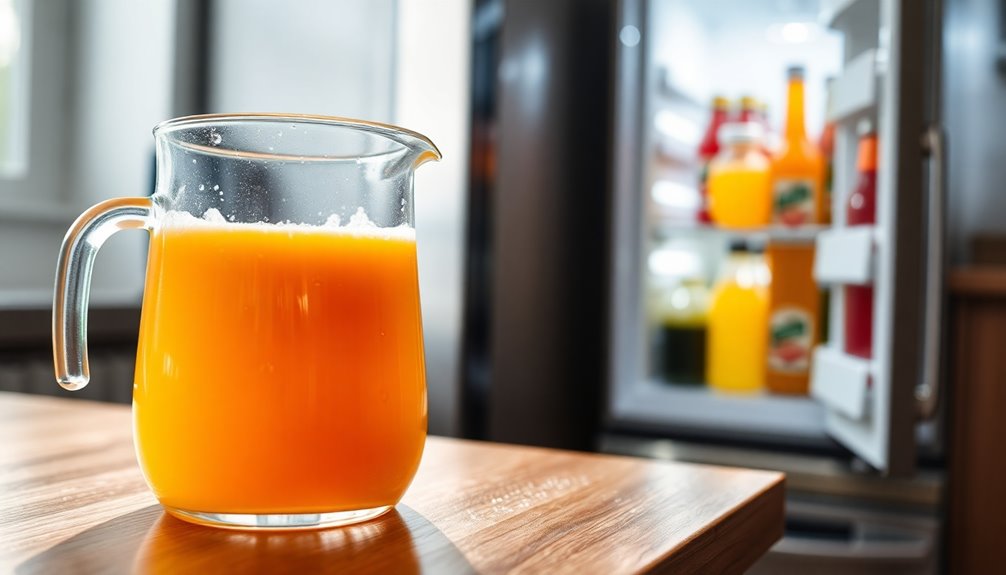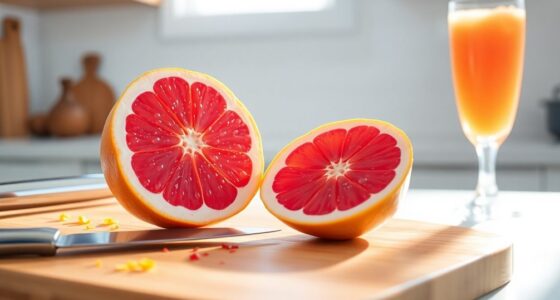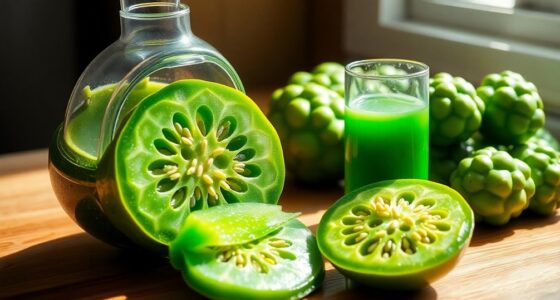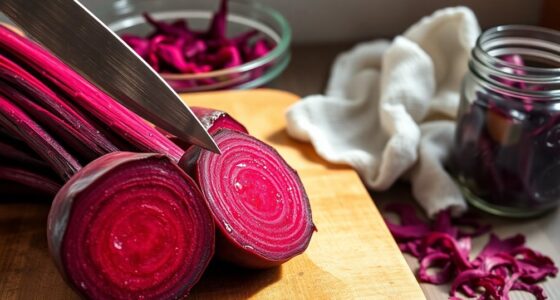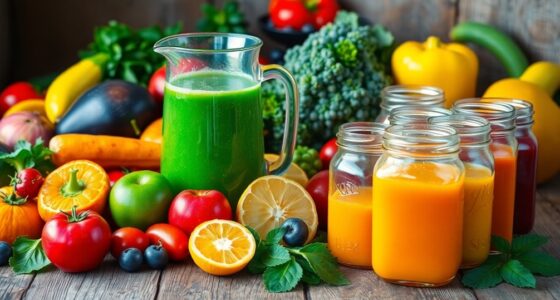Juice can last in the fridge anywhere from 24 hours to 5 days, depending on how it's made. Centrifugal juicer juice typically lasts about a day, while masticating juice can go for 2 days. Cold-pressed juice stays fresh for 3 to 5 days, and specific juices like pineapple and lemon are best enjoyed within that range too. Storing juice correctly can make a big difference in its longevity. Discover more about maximizing your juice's freshness!
Key Takeaways
- Juice from a centrifugal juicer typically lasts about 24 hours in the fridge.
- Masticating juicer juice can remain fresh for approximately 48 hours.
- Cold-pressed juice can stay fresh for 3 to 5 days in the refrigerator.
- Pineapple and lemon juices can last about 4 to 5 days, while orange juice is best within 2 to 3 days.
- Vacuum-sealed juice can remain fresh for 5 to 7 days due to reduced oxygen exposure.
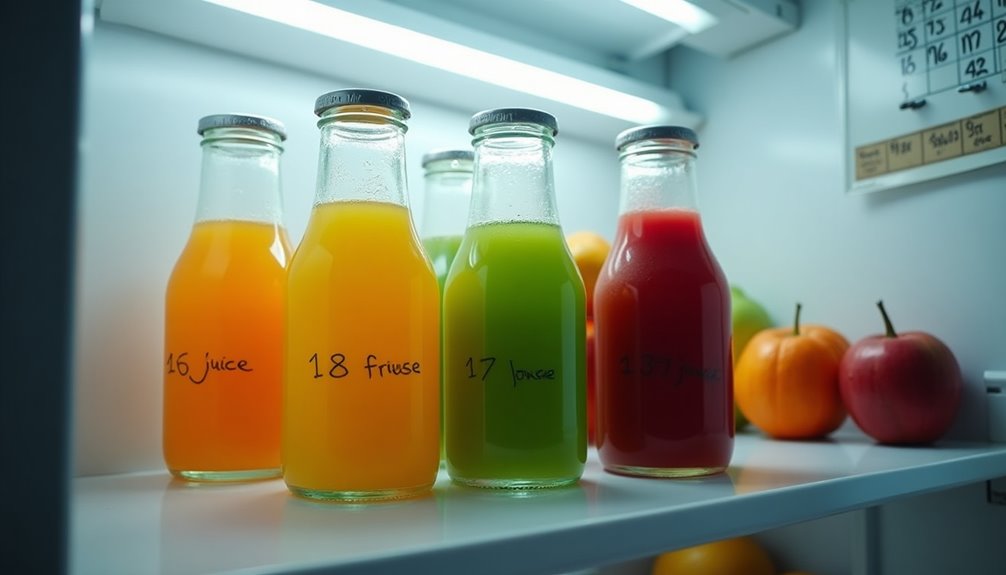
Have you ever wondered how long that freshly squeezed juice will stay good in your fridge? When you whip up a delicious blend of fruits and veggies, it's essential to know how to store it properly so you can enjoy it at its freshest. Fresh juice can be a delightful and nutritious addition to your diet, but its shelf life varies depending on how it's made and stored.
Generally, juice from a centrifugal juicer only lasts about 24 hours in the fridge, while juice produced by a masticating juicer can stretch that to around 48 hours. So, if you've got a masticating juicer, you'll have a bit more time to savor your creation.
Cold-pressed juice takes the crown when it comes to longevity. With its gentle extraction process that minimizes oxidation, it can remain fresh for a remarkable 3 to 5 days. This means you can make a batch and have it ready for several mornings.
However, not all fruits are created equal in terms of juice longevity. For instance, juices made from pineapple and lemon can last about 4 to 5 days in the fridge, while orange juice is best consumed within 2 to 3 days to ensure optimal freshness.
If you want to extend your juice's life even further, consider vacuum sealing. This method significantly reduces exposure to oxygen, allowing vacuum-sealed juice to stay fresh for 5 to 7 days. It's a handy trick if you like to prepare your juice in advance.
Just make sure to store it in airtight containers; this will help prevent nutrient degradation, which begins after about 72 hours. You'll want to consume your juice within this time frame to get the most health benefits from it.
Now, let's compare freshly squeezed juice to store-bought juice. Many people reach for store-bought juice because they assume it lasts longer. While it might've a longer shelf life due to preservatives and pasteurization, it usually sacrifices some nutritional value.
Fresh juice made at home is packed with vitamins, minerals, and enzymes that can degrade over time. So, if you're looking for the freshest juice experience, always opt for homemade when you can.
Ultimately, knowing how long juice lasts in the fridge can help you maximize both flavor and nutrition. If you're using a masticating juicer, you've got a bit more time to enjoy your juice.
Just remember to store it properly in airtight containers, and if you want to take it a step further, vacuum sealing is a great option to keep it fresh longer. So, the next time you make juice, keep these tips in mind. Make sure to consume it within a few days for the best taste and health benefits!
Frequently Asked Questions
Does Juice Go Bad in the Refrigerator?
Yes, juice can go bad in the refrigerator. You should watch for signs like cloudiness, a fizzy texture, or a vinegar-like taste, which indicate spoilage.
To keep your juice fresh longer, store it in airtight glass containers and keep the temperature between 35-40°F. If you want to extend its freshness, consider adding lemon juice, as it helps prevent oxidation and preserves flavor.
Always trust your senses before consuming juice!
Can I Drink Juice 2 Weeks After Opening It?
Imagine pouring a glass of vibrant juice, the colors dancing in the sunlight.
You've opened it two weeks ago, and now you wonder if it's still good. If it's been sitting in the fridge, that's a risk.
Even though it might look fine, trust your senses. If it smells off or tastes strange, don't drink it.
Play it safe and enjoy fresh juice instead; your taste buds will thank you!
How Long Can I Store Juice After Juicing?
After juicing, you can store your juice for varying lengths of time, depending on the juicer you used.
If you've used a centrifugal juicer, aim to drink it within 24 hours.
With a masticating juicer, you've got up to 48 hours.
For those using a twin gear juicer, your juice can last 4-5 days.
Just remember to keep it in an airtight glass container and refrigerate it at the right temperature!
How Do You Know if Juice Has Gone Bad?
Did you know that about 20% of juices spoil before you even get a chance to drink them?
To tell if your juice has gone bad, look for signs like a cloudy appearance, unusual fizz, or a boozy smell. If you spot mold or floating particles, toss it out immediately.
Lastly, if it tastes vinegary or sour, it's definitely time to say goodbye. Regular checks will keep you safe and enjoying fresh juice!
Conclusion
In conclusion, keeping your juice in the fridge can extend its freshness for about 3 to 7 days, depending on the type. It's fascinating to know that fresh juice can lose up to 50% of its nutrients within just 24 hours of being made! So, enjoy that vibrant glass as soon as you can. Remember, the sooner you drink it, the better the flavor and health benefits. Cheers to a refreshing and nutritious choice!
Cindy thoroughly researches juicing trends, techniques, and recipes to provide readers with practical advice and inspiration. Her writing style is accessible, engaging, and designed to make complex concepts easy to understand. Cindy’s dedication to promoting the advantages of juicing shines through her work, empowering readers to make positive changes in their lives through the simple act of juicing.

